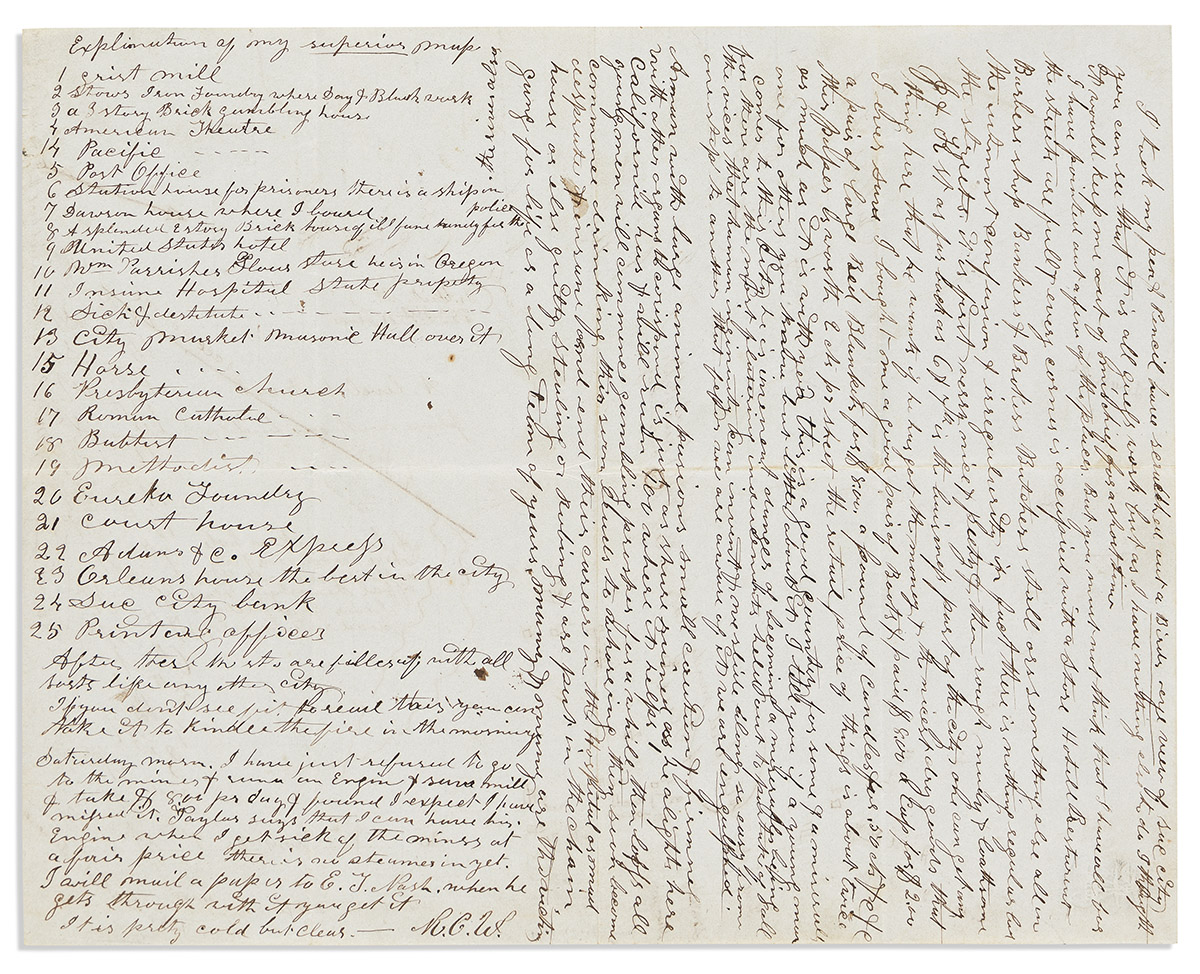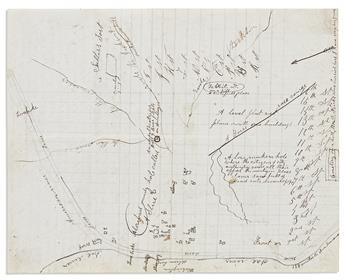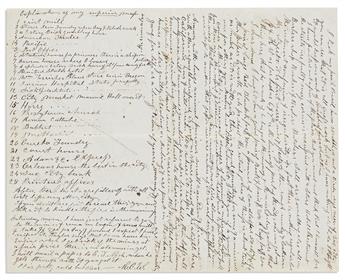Sale 2646 - Lot 62
Price Realized: $ 13,000
Price Realized: $ 16,250
?Final Price Realized includes Buyer’s Premium added to Hammer Price
Estimate: $ 5,000 - $ 7,500
(CALIFORNIA.) Ralph C. Worthington. Long run of Gold Rush letters: claim jumpers, an Indian massacre, and a map of Sacramento. 19 Autograph Letters Signed to sister Cornelia S. Worthington Ford (1824-1901), her husband William Roderick Ford (1811-), and other relatives in Hinsdale, MA; generally minimal to minor wear, most with original mailing envelopes. Sacramento and near Big Bar, CA, 1851-1853
Additional Details
"If anybody trys to jump our claims, they will be very likely to get their eyes put out."
Ralph Cushman Worthington (1827-1899) went to try his luck in the California gold fields in 1851. His first letter is dated from Sacramento on 23 November 1851, where he has been employed "discharging vessels, sacking flour &c . . . but I have one consolation & that is of seeing the elephant head & tail. There is a bull fight nearly every Sunday for which you may pay $2.00 or not see it. I chose the later. All business except public is done on Sunday, the gambling & ___ houses are kept open & men of rank visit them." On 23 December 1851, he reports that the few attendees at church were "dressed in their everyday suits, dirty & lousy, for people in this country can't live here without getting more or less lice on them."
Inserted in one of his letters is his charming and eccentric manuscript map of Sacramento, showing the street pattern, "an ampatheatre for bull & bear fights on Sundayes," Sutter's Fort, "a horse race course," and "a low sunken hole where the citizens & city authorities send all their offal, the nastyest place I ever saw, full of dead rats, manure &c &c." A key on verso notes 25 different points of interest, including banks, churches, and other institutions.
After leaving Sacramento, his first letter is dated from nearby Colusa, California on 20 March 1852. His next 12 letters are dated from Big Bar, CA in Trinity County, in the northern part of the state, and from nearby Ounce Bar and Eagle Riffle. On 16 May 1852 he describes his small company's claim, "formed as most suppose by a slide from the mountain, displacing the river. . . . There must be about 8 acres of good pay dirt, of which we hold 1/2 of it. . . . We do not want many miners to come in here, for provisions are scarce enough now. We have had nothing for several days but flour & beans & coffee. . . . We shall not starve as long as we are able to work, for the gold is here. . . . If anybody trys to jump our claims, they will be very likely to get their eyes put out. . . . We have lions, wolves, bears, lizards, scorpions &c."
On 3 June 1852, he emphasized that "our great aim is to get the most gold in the shortest time, for none of us care enough about the country to stay in it any longer than is practacable for our present & future happiness." He described Indian relations at length: "The Indians, as some others, like good blankets & a bag of flour some. They were bold some time ago that they would enter a cabin & take what they could while the men were at work close by. . . . the miners became enraged & raised a co. of about 40 or 50 & went to their ranch in the night & just at daybreak rushed upon them & killed about 130 & took 2 prisoners, while 5 or 6 only escaped. Since then we have not been troubled in the least, although there are plenty of them in this vicinity, but they are as affraid of white men as they are of lions & tigers. They have never been known to attact one unless he was alone & they some 15 or 20 strong. They are not like the Mass Indians of old, not so strong or brave & far less cunning." This horrific incident appears to match the details of the 23 April 1852 Bridge Gulch Massacre in the same county.
On 24 October 1852, Worthington describes a disgruntled employee named Robbins who snuck back to work on the claim. A partner "just steps up to him & took a pick away from him & told him to be off & if wanted him to put him out, he would do it mighty easy. Robbins felt for his pistol but did not have it with him & if he had drawn it, he never could have had to shoot, for H would have split his braines out with the pick. Robbins thought it time to leave & did so."
On 23 April 1853, his final California letter, Worthington describes continued hardship on the mining claim: "Jo Hayden, a packer, shot his arm off almost. They . . . started a man up for Dr. Jackson & waited nearly 3 days before he could get there." He also announces a change in circumstances--he has sold off his claim, as "there were several steam mills in Eureka . . . & that they wanted to get a fellow of about my complexion to come down & take a job."
Almost all of the letters are accompanied by their original envelopes. None of them bear postage stamps. 7 of the letters have envelopes with inked Sacramento postmarks and inked "10" stamps; the Colusa letter has a manuscript "20" for postage; and the 10 Big Bar-area envelopes have an inked manuscript "10" in the upper right corner for postage.
With--a letter from Dr. Henry W. Jackson (a recurring character in the letters) to Ralph Worthington proposing the expedition, New Orleans, 25 May 1850. Also, 18 letters by Worthington dated 1853-1858 from his new home in Grand Rapids / Centralia in central Wisconsin near Stevens Point, where he remained for the rest of his life. Also, more than 200 other letters addressed by various parties to William R. Ford and family members, most from various points in Massachusetts and New York, circa 1831-1858, not examined and still in envelopes or folded as stampless covers.
Ralph Cushman Worthington (1827-1899) went to try his luck in the California gold fields in 1851. His first letter is dated from Sacramento on 23 November 1851, where he has been employed "discharging vessels, sacking flour &c . . . but I have one consolation & that is of seeing the elephant head & tail. There is a bull fight nearly every Sunday for which you may pay $2.00 or not see it. I chose the later. All business except public is done on Sunday, the gambling & ___ houses are kept open & men of rank visit them." On 23 December 1851, he reports that the few attendees at church were "dressed in their everyday suits, dirty & lousy, for people in this country can't live here without getting more or less lice on them."
Inserted in one of his letters is his charming and eccentric manuscript map of Sacramento, showing the street pattern, "an ampatheatre for bull & bear fights on Sundayes," Sutter's Fort, "a horse race course," and "a low sunken hole where the citizens & city authorities send all their offal, the nastyest place I ever saw, full of dead rats, manure &c &c." A key on verso notes 25 different points of interest, including banks, churches, and other institutions.
After leaving Sacramento, his first letter is dated from nearby Colusa, California on 20 March 1852. His next 12 letters are dated from Big Bar, CA in Trinity County, in the northern part of the state, and from nearby Ounce Bar and Eagle Riffle. On 16 May 1852 he describes his small company's claim, "formed as most suppose by a slide from the mountain, displacing the river. . . . There must be about 8 acres of good pay dirt, of which we hold 1/2 of it. . . . We do not want many miners to come in here, for provisions are scarce enough now. We have had nothing for several days but flour & beans & coffee. . . . We shall not starve as long as we are able to work, for the gold is here. . . . If anybody trys to jump our claims, they will be very likely to get their eyes put out. . . . We have lions, wolves, bears, lizards, scorpions &c."
On 3 June 1852, he emphasized that "our great aim is to get the most gold in the shortest time, for none of us care enough about the country to stay in it any longer than is practacable for our present & future happiness." He described Indian relations at length: "The Indians, as some others, like good blankets & a bag of flour some. They were bold some time ago that they would enter a cabin & take what they could while the men were at work close by. . . . the miners became enraged & raised a co. of about 40 or 50 & went to their ranch in the night & just at daybreak rushed upon them & killed about 130 & took 2 prisoners, while 5 or 6 only escaped. Since then we have not been troubled in the least, although there are plenty of them in this vicinity, but they are as affraid of white men as they are of lions & tigers. They have never been known to attact one unless he was alone & they some 15 or 20 strong. They are not like the Mass Indians of old, not so strong or brave & far less cunning." This horrific incident appears to match the details of the 23 April 1852 Bridge Gulch Massacre in the same county.
On 24 October 1852, Worthington describes a disgruntled employee named Robbins who snuck back to work on the claim. A partner "just steps up to him & took a pick away from him & told him to be off & if wanted him to put him out, he would do it mighty easy. Robbins felt for his pistol but did not have it with him & if he had drawn it, he never could have had to shoot, for H would have split his braines out with the pick. Robbins thought it time to leave & did so."
On 23 April 1853, his final California letter, Worthington describes continued hardship on the mining claim: "Jo Hayden, a packer, shot his arm off almost. They . . . started a man up for Dr. Jackson & waited nearly 3 days before he could get there." He also announces a change in circumstances--he has sold off his claim, as "there were several steam mills in Eureka . . . & that they wanted to get a fellow of about my complexion to come down & take a job."
Almost all of the letters are accompanied by their original envelopes. None of them bear postage stamps. 7 of the letters have envelopes with inked Sacramento postmarks and inked "10" stamps; the Colusa letter has a manuscript "20" for postage; and the 10 Big Bar-area envelopes have an inked manuscript "10" in the upper right corner for postage.
With--a letter from Dr. Henry W. Jackson (a recurring character in the letters) to Ralph Worthington proposing the expedition, New Orleans, 25 May 1850. Also, 18 letters by Worthington dated 1853-1858 from his new home in Grand Rapids / Centralia in central Wisconsin near Stevens Point, where he remained for the rest of his life. Also, more than 200 other letters addressed by various parties to William R. Ford and family members, most from various points in Massachusetts and New York, circa 1831-1858, not examined and still in envelopes or folded as stampless covers.
Exhibition Hours
Exhibition Hours
Aliquam vulputate ornare congue. Vestibulum maximus, libero in placerat faucibus, risus nisl molestie massa, ut maximus metus lectus vel lorem.






